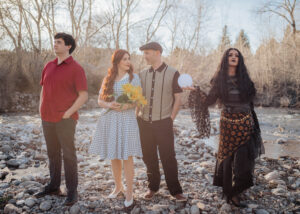OREM — Growing up in a shadow is not for the faint of heart, not like most people have a choice. Ask anyone with a shining older sibling, parent or best friend who seems to always be the sun in their social solar system, and you can immediately relate to William Bloom whose father Edward always has a whopper of a story to tell a captive audience. The Bloom family’s story is captured in the musical Big Fish with book by John August and Andrew Lippa creating the music and lyrics. I had the chance to see the musical, which is adapted from a film of the same name, on Monday April 15 at the SCERA indoor theatre.
To be clear, I walked in disliking the adaptation. The music is mostly fun but my first time seeing the play I felt that it was overly long, added songs for the sake of adding them, and shifted focus away from the emotional journey of Will’s frustration with his father onto Edward reliving the glory days. Like Will, however, hearing the story fresh gave me new eyes that were often wet with tears during the SCERA’s excellent production.
I loved Chase Ramsey’s simple scenic design choices. Projections were used at times, but they were crisp and not overdone. The base stage setup was a wide set of three stairs that ran the length of the upstage area by the cyclorama and provided nice levels when that was needed. Simple sets for hospital beds, a bedroom and a small house with a white picket fence all accented this at times. I particularly liked the decision made in concert with lighting designer Elizabeth Griffiths to have a series of rope hung lamps give ambient light to the stage across the front of the proscenium. The play’s iconic moment of flooding the stage with daffodils and falling flower petals was nicely done as well, though no eye-popping.

What was most fascinating to me, however, was that this musical’s strength was in its acting. In many productions I see, acting is often obscured by focus on production elements, dazzling dancing, or singing that is tonally stunning but emotionally dead. That wasn’t the case in this production. The singing was high quality and the dancing fun and energetic. But each character on stage carried the play’s emotional beats without winking to the audience or letting words fall emptily on the spectators.
This began at the top of the cast list with Mark Gordon’s stellar portrayal of Edward Bloom. The actor playing Edward ping pongs across time through the story’s narrative and has to play a plucky teen, absentee father to a precocious child, a passionate lover of multiple women, the sickly old man, and the headstrong man confronting his cynical adult son. Gordon gracefully slid between these aspects of Edward like he was on ice. When he was cancer stricken, the air in the room was deathly still. When he’d lay into another tall tale, it felt rehearsed in a way that only familiar family fables can be.
Gordon’s on stage chemistry with Bryson Smellie who played Edward’s son Will was palpable. Each row between father and son felt like these were rounds they had done a dozen times across decades and that each could anticipate the other’s moves. Smellie brought zeal and unresolved angst to the stage that is known uniquely to a son too like his father for his own comfort. The high energy frustration matched well the show’s overall tone and the members of the ensemble were elevated from having these electric performers to play off of.
Anya Young Wilson played Jenny Hill, the heart-rending girl left behind who had dreams and visions of being with Edward. Having Jenny played by an actress who reads as being similar in age to Gordon helped her transition from 17-year-old sweetheart to grown woman whose life is saved by Edward’s brave secret. Wilson navigated a delicate line of playing the woman whose heart is broken and never made whole, while realizing the mature choice is to let go of the person she loved. One of several times I was brought to tears was watching Wilson’s monologue as Jenny Hill when she recounts the bravery of Edward to Will, thereby allowing him to more fully understand the man he feared he didn’t know. Wilson nailed the right beats of that scene to show surprise, tenderness, and a willingness to tell the truth to a grieving son she never had.
Allison Brooks did a stellar job of finding her spots in this show to drive the narrative forward and connect emotionally. The pacing kept the energy high and allowed the scenes to not drag. Characters came on stage with meaningful business and sincere reactions. I loved watching the numerous circus hopefuls going through their routines over and over as if waiting to be called up for their moment to shine. The ensemble was also, however, nicely contained and didn’t have scene stealing or unnecessary bits added. Brooks led the cast and crew to tell a clear and concise story that struck deep chords.
SCERA has produced two stellar shows this season in A Year with Frog and Toad and now Big Fish. Audiences will be hard pressed to find a better value for their evening or wallet this spring than SCERA’s production of Big Fish. I may not see it every night, but I’d be spinning you a yarn if I told you I wasn’t trying to figure out when I can see it again.
[box]Big Fish plays Mondays and Thursdays through Saturdays at 7:30 PM. The show runs through May 4 at the SCERA indoor theatre (745 South State Street, Orem). Tickets are $8-10. For more information, visit scera.org.[/box]

